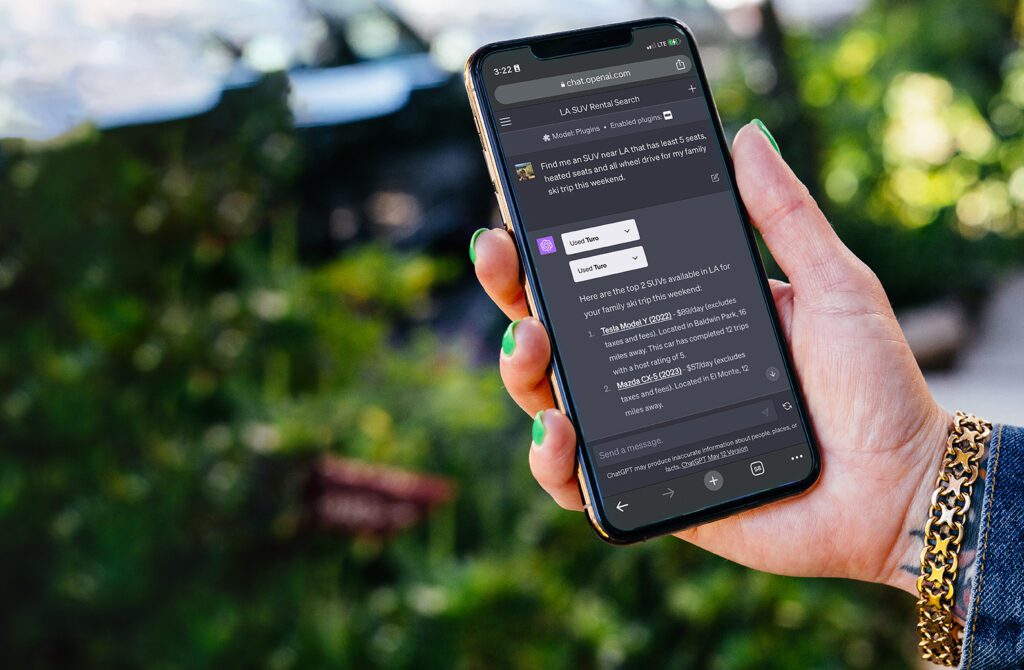Skift Take
ChatGPT plugins had already covered flight and hotel bookings. Now, two new travel companies are joining the experiment, bringing ticketed events and car rentals into the mix.

Travel Tech Briefing
Editor’s Note: Exclusive reporting on technology’s impact on the travel industry, delivered every Thursday. The briefing will guide executives as they decide if their companies should “build, buy, or partner” to stay ahead.
GetYourGuide, the booking platform for ticketed tours and activities worldwide, is the latest travel company to get a plugin on ChatGPT Plus.
The ChatGPT plugins were announced in March, originally with a handful of companies that included Kayak and Expedia.
The connection with the travel booking platforms are a way to help ChatGPT users bridge the gap between an AI-generated itinerary and actually booking the recommendations made in those itineraries.
Through the plugins, users of ChatGPT Plus — accessible through a paid subscription — are presented with up-to-date info and links for booking on the respective websites. With Kayak and Expedia, those would generally be links to flights or hotels.
As GetYourGuide outlined in a demo, users of the new plugin can submit a prompt such as, “I’m visiting London next week and want to explore the culture. Can you give me activities for under $70?” The user would then be presented with relevant results and links to book any of those ticketed activities on the GetYourGuide website.
GetYourGuide has been using generative AI for help with content creation since ChatGPT was released last fall, according to Emil Martinsek, chief marketing officer for Berlin-based GetYourGuide.
This is the first tool that the company has released externally.
“We’re experimenting very heavily with these different tool sets as they evolve — and they’re evolving very rapidly — to continue to push our product experience both customers and suppliers,” Martinsek said.
OpenAI, the company behind ChatGPT, said this month that it would be releasing plugins for more than 70 third-party websites. This strengthens ChatGPT’s development as a platform, similar to the relationship between iPhone and the Apple Store. And it’s another step toward how generative AI could revolutionize the way users plan and book travel.
Another of those 70 websites has been Turo, a San Francisco-based car rental app with more than 320,000 vehicles in four countries, the company revealed in a blog post last week.
Users of the plugin can ask for information about cars available for rental in a certain location, and the tool generates answers based on available data and provides links to book the recommendations on the Turo platform.
On the Bard side, travel booking company eDreams Odigeo said earlier this month that it’s testing Google’s generative AI capabilities on its online platforms.

The Motivation for GetYourGuide
The GetYourGuide plugin — along with the others — is an early experiment on how users could interact differently with travel booking in the future.
But for GetYourGuide, the long-term implementation of generative AI is not just focused on customers. It could also change the way that small and large tour operators interact with the GetYourGuide platform.
“We view, also, our role as how do you help the industry leverage this, not just keep it contained to our customers using our platform, but also unleash it for the suppliers to continue to grow and build their businesses over time,” Martinsek said.
A more technologically advanced platform could respond to simple language inputted by a business owner, making it easier to complete menial tasks like adjusting calendar availability.
“We think this is a great technology for a lot of the smaller suppliers because it should take away a lot of difficult, menial, mundane tasks they have to deal with and allow them to focus on operating their experiences … which is difficult today because they have 1,000 other things to manage.”
Working Through Limitations
These services can only be as good as the underlying technology, and at least for now, it’s not overturning the industry. There have been a number of experimental products released over the last several months, but much of the effort so far to use ChatGPT for travel booking has not been very useful. And of course, the tech still has plenty of glitches.
The ChatGPT chatbot can present useful answers when paired with outside data, but there’s a limit on how personalized and detailed it can be. Getting suggestions for well-known places to visit is easy, but it takes more effort and expertise to dig deeper into other options, if possible at all. The end goal for these platforms is that they’ll be easy to use — without the need for a tech background or expertise in writing prompts — for both consumers and travel providers.
“The risk is that people get too infatuated with the technology. What matters with any technological step change is that it’s ultimately a [user experience] problem,” Martinsek said. “We’re really trying to get that right. But that means you need to experiment, you need to try to put stuff out there, and this is the first visible step in that journey.”
Still in the early phases of development, GetYourGuide and the rest are gathering data that will go toward more advanced versions of the technology. That includes continuing to “teach” the AI about continuously changing inventory as well as user attributes.
“That’s actually where you unleash a lot of potential, is how it continues to learn on GetYourGuide’s content, but also on the user who’s interacting,” Martinsek said.
Skift AI Travel Newsletter
AI coverage across travel sectors that’s focused on separating trendy moves from good ideas – in your inbox every Friday.
Have a confidential tip for Skift? Get in touch
Tags: artificial intelligence, chatgpt, generative ai, getyourguide, OpenAi, Skift Pro Columns, tour operators, travel tech, Travel Tech Briefing